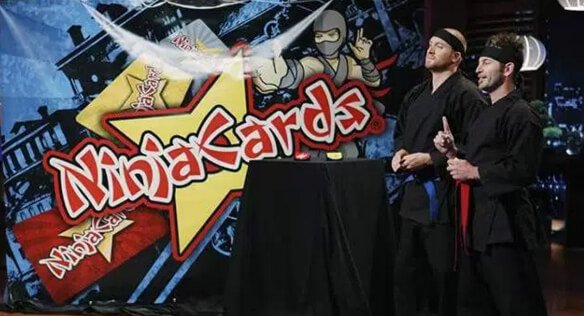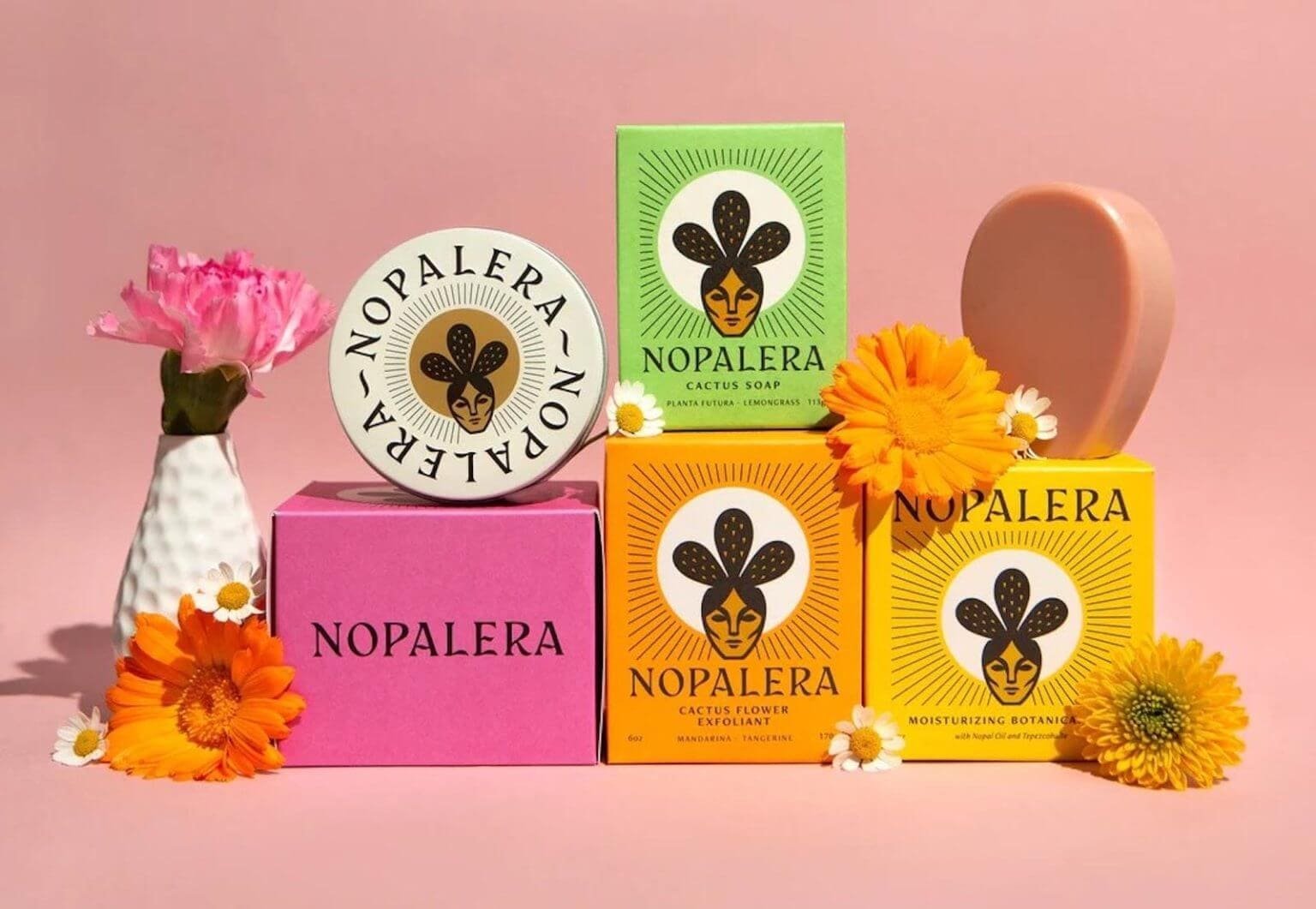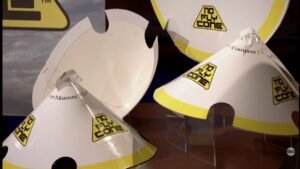You ever watch Shark Tank and think, That was genius! Easy millions. But then you check a year later, and the business is gone without a trace. Happens all the time. So what about Ninja Cards—the card-throwing game that crashed the Shark Tank party in full ninja gear? Was it a hidden weapon or just another dream that got sliced up on national TV?
Let’s skip the fairy tales. I’ve watched plenty of founders pitch flash over fundamentals—and I’ve seen hustlers pull off comebacks nobody saw coming. Here’s the full breakdown on Ninja Cards, the startup, the spectacle, and the cold, hard results—so you know what’s hype and what’s real if you’re eyeing your own shot.
Contents
ToggleWhat Is Ninja Cards? Pure Playground, Ninja-Style
Here’s the pitch in 10 seconds: Ninja Cards is a family game that lets you whip plastic cards at a target board, like darts, but with a ninja twist. Forget poker night—this is about skill, competition, and a flash of martial arts attitude. Think of it as old-school darts mixed with casino energy and an after-school cool factor—throw, aim, score. The branding? Full-on ninja. The vibe? Anyone can play, but you’ll want to brag when you win.
Why does this matter? Because most toy and game startups bore us to tears. Ninja Cards at least brought personality, action, and a heck yeah, I’ll try that at a party energy.
Meet the Founders: Dustin Berk & Ken Haton—the Garage Innovators
There’s no corporate boardroom here. Dustin Berk and Ken Haton weren’t toy execs; they were buddies tossing hotel key cards for fun on business trips. That’s it—the whole idea started with two dudes, a hotel habit, and a garage full of spray paint.
How did it turn into a real product? Simple. They built their own boards. They customized cards, tested different designs, and ran late-night test sessions with friends. That’s what real product validation looks like—not a focus group, but seeing who sticks around at midnight for just one more throw. Dustin and Ken played every angle—they were scrappy, creative, and quick to iterate.
If you’re an entrepreneur, don’t miss this lesson: The best ideas usually don’t come from offices. They come from boredom, resourcefulness, and a willingness to test and look ridiculous before you get it right.

Pre-Shark Tank Moves: Did Ninja Cards Actually Hustle?
Before TV came calling, Berk and Haton weren’t just waiting for luck. They did hard time on the toy fair circuit—Chicago and New York, not exactly the easiest crowds. They took swings at swap meets in Irvine, California, running their own sales and getting live feedback. That’s not glamorous, but it’s how you learn what actually sells.
At the Chicago Toy Fair, Ninja Cards even landed a licensing offer from a major toy company. That hint of validation matters. Most garage startups never get that far. But there’s a twist: Despite all their grind, their traction was still small—no blowout sales, just early interest and shoebox-level numbers.
Here’s a truth I’ve seen a hundred times: You’re only as good as your last quarter. Early buzz is nice. Sustainable revenue is what keeps you alive.
The Big Ask: Ninja Cards’ Shark Tank Valuation & Pitch Math
Let’s talk numbers—it’s where most founders get exposed. Ninja Cards hit Shark Tank’s Season 6, Episode 603, in October 2014. Their ask? $60,000 for 30% equity. That’s a $200,000 pre-money valuation. Modest. Smart. They didn’t roll out some silly $2 million fantasy number—these guys knew they had an interesting play, not the next tech unicorn.
The real question is whether that valuation matched reality. Here’s what we know: By the time they hit the Tank, they’d sold at toy fairs and swap meets, but their annual revenue was far from impressive. Probably less than six figures when they pitched. They wanted the Sharks to bet on brand, hustle, and some cool party game factor, not just hard math.
In my experience, founders who keep the valuation low usually understand where they’re weak. Still, sometimes confidence can’t make up for a missing sales hockey stick.

Shark Tank Pitch: How Ninja Cards Played the Room
This is where founders either freeze up, show off, or get eaten alive. Dustin and Ken went in full character—one was The Red Dragon, the other was The Butcher. Goofy? Maybe. Memorable? Absolutely.
Instead of just talking, they had the Sharks (Mark Cuban, Lori Greiner, Kevin O’Leary, Robert Herjavec, Daymond John—yeah, it was a stacked panel) all throwing cards and getting hooked on the vibe. The room lit up. You want your demo to get Mark Cuban standing and tossing cards? That’s a win for engagement.
But after the laughs dies down, Sharks want to know: Is there money in this, or is it just a fun Friday night game? That’s where things cooled.
Who Bit? The Sharks’ Verdict—Deal or Steal?
Here’s the raw truth: Not a single Shark put up an offer. The ‘sharks’ did not bite, the Los Angeles Times put it bluntly.
Why no deal? They saw the hustle, enjoyed the game, but didn’t see breakout potential—no evidence this would become the next Pie Face or Connect Four. The feedback was classic Shark Tank: Cool product, but tough to scale. Niche game, no recurring revenue, risk of fizzling after a TV high.
I’ve seen this so many times—some pitches pop for 48 hours then vanish because nobody actually buys them once the adrenaline wears off.
No Deal: Ninja Cards After Shark Tank—Did TV Move the Needle?
A lot of founders think Shark Tank exposure alone is a silver bullet. Reality check: that’s rare. For Ninja Cards, the Shark Tank effect did buy them some momentum.
The business kept rolling for several years. By August 2021, the company was reportedly still bringing in about $100,000 in annual revenue. Respectable for a small toy startup without a major retail deal. But underneath, cracks were showing. The Ninja Cards website showed stuff in-stock, other items sold out, with a hopeful back in February 2022 message that basically looked like wishful thinking.
By 2018, according to the founders, the real business had already folded. TV buzz slowed, retail never took off, and the market for homegrown target games just never really scaled.
Are They Still in Business? The Current Ninja Cards Status (2024)
Here’s where you separate winners from survivors. As of now, Ninja Cards is not an active company. The website sits half-alive, mostly for nostalgia. Products are listed as sold out. Real sales have dried up. The founders—Dustin Berk and Ken Haton—have moved on. Are they hustling elsewhere? Likely, but their next gigs are under the radar.
If you’re checking SharkWorth, you’ll see it: Ninja Cards has closed up shop. No Amazon presence. No Instagram grind. If you want a set, you’re basically scouring eBay or hoping your cousin didn’t throw it away.
Legacy Play: What Did Ninja Cards Actually Achieve?
Now, here’s why I respect the founders anyway. Ninja Cards may not have become Scrub Daddy, but it did prove some hard truths:
- Anyone can start something memorable with ingenuity and guts (even if it means spray-painting foam in a garage).
- A few toy fairs and a TV shot can give you buzz, not a business.
- Sometimes you don’t need world domination—just a good product people remember at parties.
They called theirs the first card throwing game ever—and for a minute, they owned that title. For other game creators, Ninja Cards is a blueprint in hustle, honest pivots, and knowing when to walk.
Entrepreneur Lessons: Ninja Cards, Unfiltered
Here’s what hits me as an operator looking at Ninja Cards:
- They kept their ask realistic. No Shark likes a founder who doesn’t know their worth.
- They hustled hard before ever stepping on TV. Shark Tank didn’t create their story—it amplified it.
- They couldn’t crack the retail or viral nut. Card throwing is fun, but niches have hard ceilings.
- Even after TV, founders must create real momentum—don’t just ride the as seen on TV wave.
- Honesty matters. Admitting when it’s time to sunset a brand is real maturity.
- Most importantly? Failing on a big stage doesn’t close doors if you own the experience, learn, and move forward.
FAQs about Ninja Cards on Shark Tank
1. Is Ninja Cards from Shark Tank still in business?
No, Ninja Cards is closed. The website is mostly inactive, and there’s no current product line available.
2. How much revenue did Ninja Cards earn after Shark Tank
Reportedly, they reached about $100,000 in annual revenue at their high point, but it wasn’t enough to scale.
3. Did Ninja Cards ever get a deal with any investor after the show?
No investors stepped in, even after Shark Tank. The company remained fully founder-owned until closing.
4. Can you still buy Ninja Cards online today?
Officially, no. The website lists everything as sold out and no new inventory has come through since 2018.
5. Who owns the Ninja Cards brand now?
The original founders, Dustin Berk and Ken Haton, still control any rights. But the business is not operational.
6. What are Dustin Berk and Ken Haton working on currently?
They’ve moved on to other pursuits, but details aren’t clear from any sources or SharkWorth.
7. Why did the Sharks pass on Ninja Cards?
Great demo. Not enough evidence that it could break out nationwide. Too niche, too risky, and hard to scale.
8. Was Ninja Cards ever picked up by a major toy company?
They got an early licensing offer at the Chicago Toy Fair, but nothing permanent. No major company signed a deal.
Final Take: What We Can Learn From Ninja Cards’ Shark Tank Story
Forget the highlight reels. Ninja Cards is a classic example of hustle, fun, and honest limits. It wasn’t a failure—it just stayed a small win, not a billion-dollar jackpot.
If you’re dreaming of your own Shark Tank run, remember this: flash matters, fun sells—at least for a minute. But long-term, you need real market pull, money in the bank, and enough grit to admit when to pivot or pack it in.
That’s business—messy, fun, risky, and nobody’s writing your ending but you.










